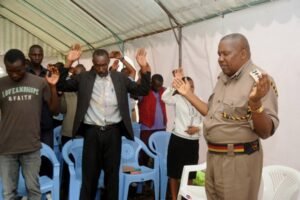
Participants during the Public Engagement Forum in Mau Narok on strategies of holding leaders to account
In a report on the status of the County Government of Nakuru projects, Kimugul ECDE center in Nessuit was complete, but as they say “kwa ground vitu ni different” Indeed it was a different story.
Dennis Korir could not sit pretty and agree with the disservice.
In October 2023, he took up the initiative.
He sought access to information on the said project through the County Chief Officer in charge of Education which listed the date and completion of the project and the amount utilized.
He presented the document received and stamped by the officers at the Chief Officer’s office where he remained with his copy.
After 21 days, he received a response from the Chief Officer, who agreed that the center was not constructed due to land disputes on the piece of land and it was an error on the report to allude that the project was complete.
The response further detailed the cause of action on the project which included the new site for the construction and the budgetary allocation towards the project.
The project has been completed this month (July 2024).
In Ndeffo village, Mugomoine Sub Location of Kihongo ward, Bernard Thuku was unhappy.
Patients at his local Mtarakwa Dispensary were complaining of a lack of drugs at the facility.
He narrated,
“I met my neighbor at our local shopping center and after exchanging pleasantries I enquired where she was heading and she said she was going s to the dispensary to get a list of drugs to buy because she wasn’t feeling well.
I further inquired why she was going to get the prescription and not get treated and she said “Hospitali haina dawa”
That baffled me and I decided to go to the dispensary and find out for myself.
At the waiting bay, patients discussed where they could get drugs at an affordable fee after being examined.
I undertook the activity in concurrent days and I truly established the dispensary lacked drugs.
I wrote a memorandum to the facility in charge explaining my experiences and the services offered by the dispensary
based on those experiences.
The facility in charge responded after two weeks noted the concerns as valid and explained what they were doing to address it.
That was October last year, after month drugs were delivered in the facility, and community members seeking treatment at the facility were now able to get medications at a subsidized price.”
Bernard and Dennis are among the community champions holding leaders to account based on the approved budgets and their
commitments to community members.
This is through the Kenya Electoral Conflicts Mitigation & Civic Education Support program #ECEES facilitated by MIDRIFT HURINET through support from USAID Kenya through Act Change Transform.
The two community members were part of a forum held in Mau Narok ward that sought to sensitize community members on strategies for holding leaders to account.
Budget champions, religious leaders, women & youth group leaders, Human Rights Defenders, and Community Health Promoters were targeted.
They were capacity strengthened on utilizing Petitions, Memorandum, and Access to information when seeking information from duty bearers and the timelines set aside.
Petitions, Memorandum, and Access to information are constitutionally protected and are an avenue for fostering accountability and good Governance.
These provisions are in the Bill of
Rights;
Petitions are protected under Article 37 which states, “Every person has the right, peaceably and unarmed, to assemble, to demonstrate, to picket, and to present petitions to public authorities.”
Access to information is safeguarded under Article 35 which states,
“1) “Every citizen has the right of access to—
(a) information held by the State; and
(b) information held by another person and required for the exercise or protection of any right or fundamental freedom.
(2) The State shall publish and publicize any important information affecting the nation.
(3) Every person has the right to the correction or deletion of untrue or misleading information that affects the person.”
Memorandums are safeguarded under Article 118 which says,
“1) “Parliament shall—
(a) openly conduct its business, and its sittings and those of its committees shall be open to the public; and
(b) facilitate public participation and involvement in the legislative and other business of Parliament and its committees.
(2)Parliament shall not exclude the public, or any media, from any sitting unless in exceptional circumstances the relevant Speaker has determined that there are
justifiable reasons for the exclusion.”
The following ACTS of Parliament further supplement what is in the Kenyan Constitution
Petitions:
Petition to Parliament (Procedure) Act, 2012: This Act provides for the procedure for presenting petitions to Parliament. It outlines the format and requirements for submitting petitions and ensures that citizens can present their grievances and requests to their elected representatives.
Access to Information:
Access to Information Act, 2016: This Act gives effect to Article 35 of the Constitution by providing for the right to access information held by public entities and private bodies.
The Act outlines the procedures for requesting information and mandates public entities to disclose information of public interest proactively.
Memoranda:
Public Participation Bill: This Bill, when enacted, aims to provide a framework for public participation in governance processes, including the submission of memoranda. It seeks to ensure that the public can engage in legislative processes and have their input considered in decision-making.
During the forum, Community members agreed on having a unified voice when articulating issues of concerns in their communities to duty bearers & following up on projects budgeted for but the status of their progression is not based on the timelines of contractual obligations and formally notifying the accounting officers and other duty bearers on issues of concerns on projects.
By Jacob Karani



